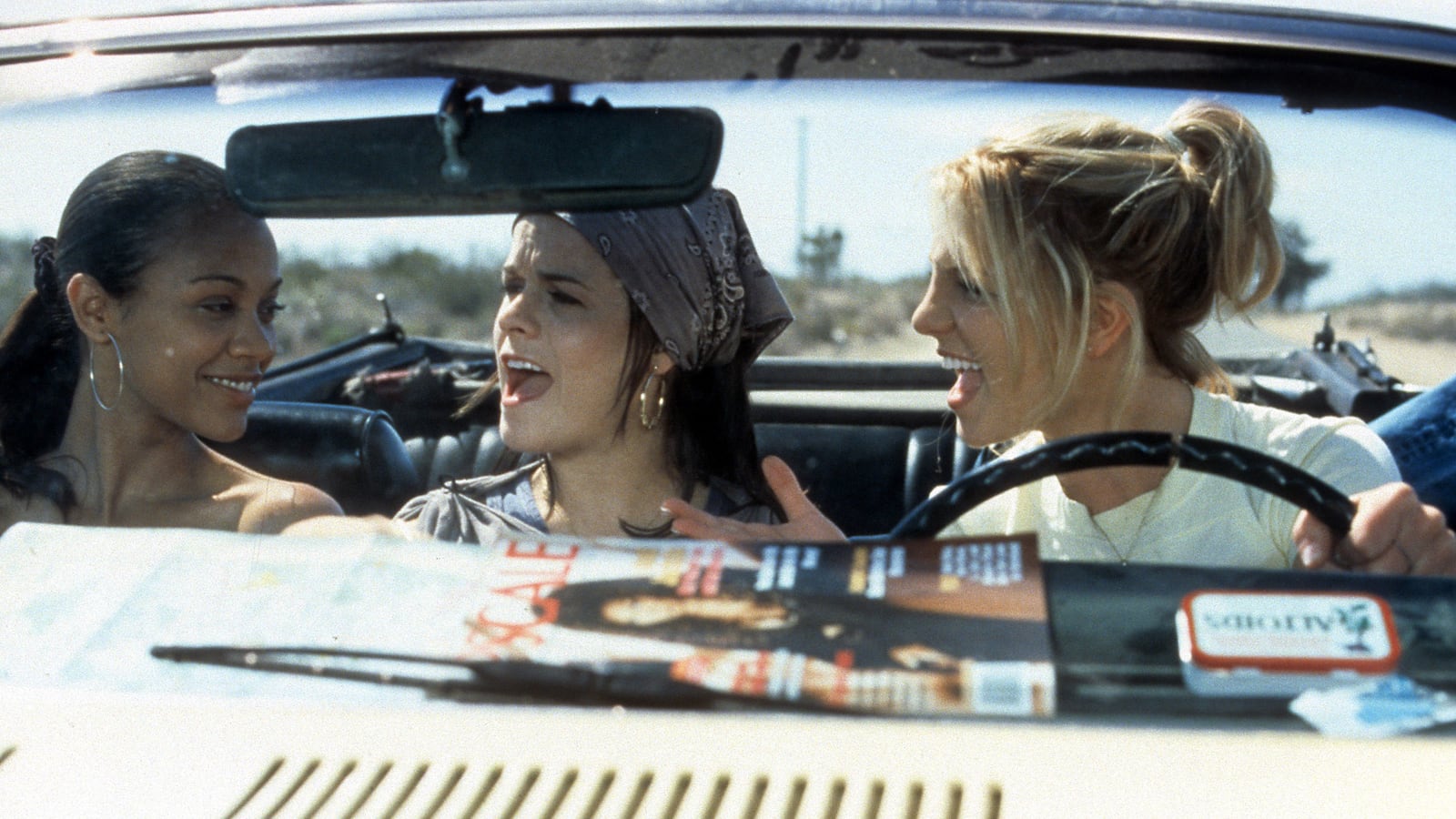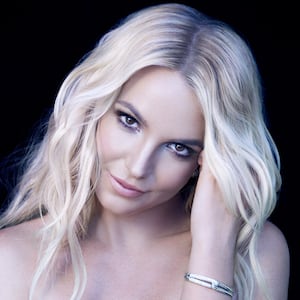There was a fleeting time for teenage me, and I think many women, when my newfound hotness was magic. It happened just after I got boobs and ended, abruptly, the first time a boy grabbed my butt without asking. Before my body became a liability, the reason to cover up or else, I had the opportunity to perform the kind of womanhood I’d only seen in music videos or perfume ads.
I wore as little as possible, stared in anything remotely reflective—a mirror, sure, but also a parked car or store window—for as long as I could. I tied up my shirt, stared at my belly, and delighted in my movement, my new slopes and shapes.
Britney Spears seems to live like this, permanently. Her Instagram is an endless stroll of unabashedly joyous dance videos. So much has been made of her body, seemingly up for public consumption since she was a 16-year-old in a schoolgirl skirt and crop top. And yet she still has the gall to shimmy and twirl, show off in a way that so many of us haven’t been able to since someone told us we were bad at it.
The pop icon was responsible for the soundtrack of my unfurling womanhood. She packaged the messiness of being a girl into blissful bubblegum pop. “Oops!...I Did It Again” is an old friend of mine; it’s kept me company during sleepovers and school dances, and played while I was getting ready or on my way to nearly every big night of my life.
I put on the song right after I watched the new documentary, Framing Britney Spears. It had been a while since I listened to the song. Pre-pandemic, it was inescapable, though I never much noticed when it was on. There would always be another time to hear it—another party, another long car ride, another few minutes bopping my head along with the radio in my dentist’s waiting room. Of course, I don’t do these things anymore.
The new film shows all the painful ways we took Spears for granted. At the peak of her breakdown, every day was a new drama, a new scandal, a new pound lost or gained, all gleefully reported by grocery store tabloids. It should have broken her, and indeed it thrust her into the shady conservatorship that’s taken her autonomy away. But not when she’s dancing.
Or so the #FreeBritney liberation narrative goes. Of course, we know so little about what she really thinks. As the star cryptically posted this week, “Remember, no matter what we think we know about a person's life it is nothing compared to the actual person living behind the lens.”
The night after I watched Framing Britney Spears, I returned to her 2002 teen drama Crossroads. I hadn’t seen it in a while, but remembered the gist. It is basically a combination of nearly every Very Special Episode trope, culminating in that all-important rite of passage: a teenage girl’s first time.
I don’t remember the very first time I saw the film, but I know it was a staple at middle school sleepovers. Once the parents went to bed and the lights were off, my friends and I would turn it on, our faces suddenly illuminated by scenes that seemed very grown-up to us back then. I fully believed that the film was a peek into the future. I saw its archetypes—the good girl, the bad girl, the mean girl—and wondered who I was destined to become.
I vaguely remembered the opening scene: Spears’ kid sister, Jamie Lynn, plays the younger version of her character Lucy. Along with her friends Kit and Mimi, Lucy buries a treasure box of memories. They all promise to dig it up when they reach the absolute peak of adulthood, high school graduation.
It’s sweet and wholesome; as the camera pans up to a Georgia night sky, you hear their little girl voices pledging to be friends forever.
Cut to: graduation day. We first see Spears-as-Lucy, feeling herself the way a teenage girl only can in her bedroom. She sings Madonna’s “Open Your Heart” into a spoon, executing some impressive choreography for a supposedly nerdy character who has no dance training.
She’s wearing tight boy shorts, a lace cami, thick white socks, and a cowboy hat for some reason. At school, she’s the prim-and-proper valedictorian saving herself for marriage (or at least for someone a little cooler than her gawky boyfriend, played by Justin Long). Lucy’s not a prude, she just wants to wield her budding sexuality on her own terms. In the first 15 minutes of the film, Lucy’s arc materializes—when she finally has sex for the first time, we’ll know the movie’s almost over.
At the time, grown adults were salivating over sordid details of Spears’ own disputed virginity. Justin Timberlake and Limp Bizkit frontman Fred Durst gave tidbits about their alleged dalliances with Spears in interviews, little breadcrumbs for a ravenous media obsessed with her bedroom.
Lucy wants to sing, but her single father—played by Dan Aykroyd, doing one of the worst Southern accents I’ve ever seen on film—pushes her to study medicine. Kit (Zoe Saldana) and Mimi (Taryn Manning), the girls she promised to stay besties with, have long since broken off into different friend groups.
Kit is popular, snooty, better than everyone. She wants to get to California to see her long-distance, college-age boyfriend, though it’s obvious he is over the relationship. Mimi is pregnant, and branded as a slut after her boyfriend denies he’s the father.
The three young women haven’t spoken in years, but they agree to drive across the country together. (Just go with it.) They bring along Ben (Anson Mount), a guy with a mysterious past, because he’s cute in a very early-aughts way and he has a vintage convertible.
Ben initially views his traveling companions as pests, mostly because one time they changed the radio to a Shania Twain song and that’s chick music. “Do you have any idea what it’s like being surrounded by girls?” he asks, exasperated, when Spears tries to drive his car while he’s asleep in the back.
As Anne Cohen wrote in Refinery29, critics like Peter Travers wrote the film off as “one long, chick-flick slog.”
“There is sadness and pain running through the movie,” Cohen wrote. “Believe it or not, teenage girls don’t just respond to sunshine and rainbows.”
But the best parts of the movie exalt in escapism. As Cohen wrote, these flashes happen when the characters “get to be teenagers, existing in that rare place where all that matters is their own thoughts and feelings.”
When the gang’s car breaks down and they need to find some quick cash, Mimi suggests singing in a local karaoke bar for tips. Before going out on stage, they fluff each other up. It’s a controlled sexiness, a way to be safe in front of an audience that wants to look but can’t touch.
Later, as the girls share a spread of convenience store snacks, we learn that Mimi’s pregnancy is the result of a date rape. There’s a final, brutal reveal when the group makes it to Los Angeles and Kit goes to see her boyfriend: he is the man who assaulted Mimi.
The exact moment this happens, Lucy is in a motel room, about to have sex for the first time with Ben. It’s gentle and intimate, presumably exactly what she was waiting for. They’re alone in front of a window that faces the beach. As they fall into bed, the waves softly crash against the sand.
You think back to the last time you saw Lucy in a bedroom—her own. There were records on the wall, pictures of smiling friends. A globe, propped up on some textbooks, promised the entire word. She moved in the space without any inhibitions. Every prop in sight belonged to her.
Compared to the violent way Mimi lost her virginity, Lucy’s first time is a dream. Afterwards, she tells her father she’s never coming back to Georgia, sings “I’m Not a Girl, Not Yet a Woman” at an audition, and the movie is over.
It hits: You sat through an entire 90 minutes just to watch Spears lose it to some dude who loves the guitar and hates wearing shirts.
Britney’s first scene in Crossroads shines, but the film never reaches the potential of what it could be, when it’s just a young woman ebullient and radiant, at home by herself. But isn’t that typical? The night out is never as fun as the lead-up, when you’ve got dozens of outfits sprawled on your bed and your best friend doing your eyeliner. The sex is never as earth-shattering as how you spent years of your young life imagining it could be.
Now that I have re-watched the film, I think back to myself at those sleepovers, sitting in front of the television and wondering which part I would be. I want more for my past self than the roles she was given, and I am disappointed I was sold such shallow fairy tales. But I am even more angry that’s what Spears, Saldana, and Manning had to work with.
Crossroads, is, ultimately, a film about disenchantment. It’s a glimpse of that first thud into adulthood, and how we’re all expected to somehow nimbly cartwheel out of it. Womanhood means getting just hard enough to survive this world while retaining a bit of that girlish softness. And if we ever need some help, we can—eyeliner to hand, dresses scattered all over the bed—always rely on the music that got us there.







